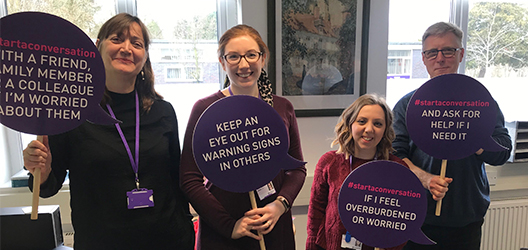7 Mar 2019
What to do if you’re worried about someone’s mental health
Would you know what to say to a friend or colleague if you suspected they were struggling with their mental health, and possibly having thoughts about suicide?
Today (Thursday 7 March) is University Mental Health Day, and Loughborough is using its voice to ‘start a conversation’.
During transitions and periods of emotional distress, such as leaving home for the first time and arriving at university, some students can feel alone, isolated and at times have thoughts about death.
There are many support services available at Loughborough University and sometimes a friend, academic or warden will see signs that a student is having difficulties.
However, there are also things which staff and students can do to make people feel less alone and more confident to share difficult feelings.
This year we are asking the Loughborough Family to pledge to start a conversation.
Specifically, we are asking you to pledge to:
- Start a conversation if you feel overburdened or worried
- Start a conversation with a friend, family member or colleague if you are worried about them
- Start a conversation and ask for help if you need it
- Keep an eye out for warning signs in others
The University’s Mental Health Team will be out and about on campus today with plaques featuring each of the messages above.
They are asking students to consider making one of these pledges, and if they feel confident enough, to share photos of themselves with the plaques on social media, using the hashtags #startaconversation and #lborofamily.
Below are some tips of what to do if you are concerned about someone:
- Things to look out for - whether it is a friend, supervisee or colleague, know the signs to look out for. These include changes in behaviour, a loss of interest in activities or talking about hopelessness or feeling alone.
- Offer help - There’s no better way to show that you’re a kind, approachable person than to be helpful. If you find yourself in a situation where you can lend a hand, do it. For example: “It looks like you are having a difficult time, do you need any support?”
- Show empathy - Empathy is the skill of being with someone and showing that you understand their perspective. For example, as an academic you may have experienced the pressure or anxiety linked to research, so by talking to and showing your understanding to a colleague or student it can really help them.
- Be authentic - Showing that you genuinely care and are worried about an individual’s wellbeing is the first step in an interaction. E.g. “I’ve noticed you’ve not been around a lot lately and I’m worried about you, is there anything I can do to help?”
- Know where to go next – Having an understanding of both the University and wider community support services that can help students who are experiencing mental ill health or emotional distress is a good place to start.
The University has a Medical Centre on site, Wellbeing Advisers within Academic Schools, a Student Advice and Support Service, alongside Mental Health and Counselling Services as well as a Centre for Faith and Spirituality.
The local community can offer support through the NHS’s Let’s Talk Wellbeing service, as well as Harmless – which supports people bereaved by suicide – and Turning Point, which offers a 24-hour crisis helpline.
The Start a Conversationwebsite also offers advice and resources. Should you require urgent help, visit the Leicestershire NHS webpages for contact details.















